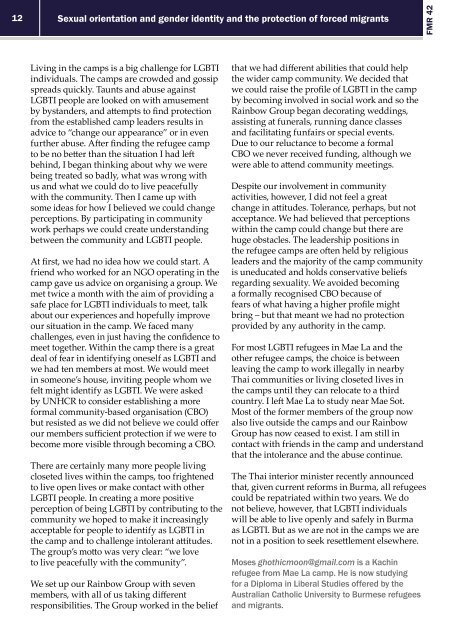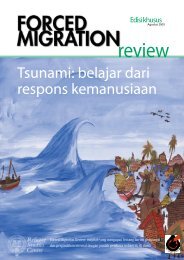FMR 42 full issue pdf - Forced Migration Review
FMR 42 full issue pdf - Forced Migration Review
FMR 42 full issue pdf - Forced Migration Review
You also want an ePaper? Increase the reach of your titles
YUMPU automatically turns print PDFs into web optimized ePapers that Google loves.
12 Sexual orientation and gender identity and the protection of forced migrants<br />
<strong>FMR</strong> <strong>42</strong><br />
Living in the camps is a big challenge for LGBTI<br />
individuals. The camps are crowded and gossip<br />
spreads quickly. Taunts and abuse against<br />
LGBTI people are looked on with amusement<br />
by bystanders, and attempts to find protection<br />
from the established camp leaders results in<br />
advice to “change our appearance” or in even<br />
further abuse. After finding the refugee camp<br />
to be no better than the situation I had left<br />
behind, I began thinking about why we were<br />
being treated so badly, what was wrong with<br />
us and what we could do to live peace<strong>full</strong>y<br />
with the community. Then I came up with<br />
some ideas for how I believed we could change<br />
perceptions. By participating in community<br />
work perhaps we could create understanding<br />
between the community and LGBTI people.<br />
At first, we had no idea how we could start. A<br />
friend who worked for an NGO operating in the<br />
camp gave us advice on organising a group. We<br />
met twice a month with the aim of providing a<br />
safe place for LGBTI individuals to meet, talk<br />
about our experiences and hope<strong>full</strong>y improve<br />
our situation in the camp. We faced many<br />
challenges, even in just having the confidence to<br />
meet together. Within the camp there is a great<br />
deal of fear in identifying oneself as LGBTI and<br />
we had ten members at most. We would meet<br />
in someone’s house, inviting people whom we<br />
felt might identify as LGBTI. We were asked<br />
by UNHCR to consider establishing a more<br />
formal community-based organisation (CBO)<br />
but resisted as we did not believe we could offer<br />
our members sufficient protection if we were to<br />
become more visible through becoming a CBO.<br />
There are certainly many more people living<br />
closeted lives within the camps, too frightened<br />
to live open lives or make contact with other<br />
LGBTI people. In creating a more positive<br />
perception of being LGBTI by contributing to the<br />
community we hoped to make it increasingly<br />
acceptable for people to identify as LGBTI in<br />
the camp and to challenge intolerant attitudes.<br />
The group’s motto was very clear: “we love<br />
to live peace<strong>full</strong>y with the community”.<br />
We set up our Rainbow Group with seven<br />
members, with all of us taking different<br />
responsibilities. The Group worked in the belief<br />
that we had different abilities that could help<br />
the wider camp community. We decided that<br />
we could raise the profile of LGBTI in the camp<br />
by becoming involved in social work and so the<br />
Rainbow Group began decorating weddings,<br />
assisting at funerals, running dance classes<br />
and facilitating funfairs or special events.<br />
Due to our reluctance to become a formal<br />
CBO we never received funding, although we<br />
were able to attend community meetings.<br />
Despite our involvement in community<br />
activities, however, I did not feel a great<br />
change in attitudes. Tolerance, perhaps, but not<br />
acceptance. We had believed that perceptions<br />
within the camp could change but there are<br />
huge obstacles. The leadership positions in<br />
the refugee camps are often held by religious<br />
leaders and the majority of the camp community<br />
is uneducated and holds conservative beliefs<br />
regarding sexuality. We avoided becoming<br />
a formally recognised CBO because of<br />
fears of what having a higher profile might<br />
bring – but that meant we had no protection<br />
provided by any authority in the camp.<br />
For most LGBTI refugees in Mae La and the<br />
other refugee camps, the choice is between<br />
leaving the camp to work illegally in nearby<br />
Thai communities or living closeted lives in<br />
the camps until they can relocate to a third<br />
country. I left Mae La to study near Mae Sot.<br />
Most of the former members of the group now<br />
also live outside the camps and our Rainbow<br />
Group has now ceased to exist. I am still in<br />
contact with friends in the camp and understand<br />
that the intolerance and the abuse continue.<br />
The Thai interior minister recently announced<br />
that, given current reforms in Burma, all refugees<br />
could be repatriated within two years. We do<br />
not believe, however, that LGBTI individuals<br />
will be able to live openly and safely in Burma<br />
as LGBTI. But as we are not in the camps we are<br />
not in a position to seek resettlement elsewhere.<br />
Moses ghothicmoon@gmail.com is a Kachin<br />
refugee from Mae La camp. He is now studying<br />
for a Diploma in Liberal Studies offered by the<br />
Australian Catholic University to Burmese refugees<br />
and migrants.




